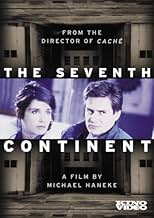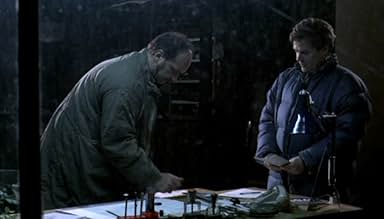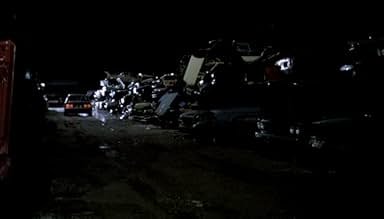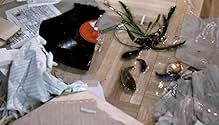IMDb-BEWERTUNG
7,6/10
18.396
IHRE BEWERTUNG
Eine europäische Familie, die vorhat, nach Australien zu fliehen, scheint in ihrer täglichen Routine gefangen zu sein. Doch hinter ihrer scheinbar ruhigen und sich wiederholenden Existenz pl... Alles lesenEine europäische Familie, die vorhat, nach Australien zu fliehen, scheint in ihrer täglichen Routine gefangen zu sein. Doch hinter ihrer scheinbar ruhigen und sich wiederholenden Existenz planen sie in Wirklichkeit etwas Unheimliches.Eine europäische Familie, die vorhat, nach Australien zu fliehen, scheint in ihrer täglichen Routine gefangen zu sein. Doch hinter ihrer scheinbar ruhigen und sich wiederholenden Existenz planen sie in Wirklichkeit etwas Unheimliches.
- Regie
- Drehbuch
- Hauptbesetzung
- Auszeichnungen
- 2 Gewinne & 1 Nominierung insgesamt
Jennifer Rush
- Self
- (Archivfilmmaterial)
- (Nicht genannt)
Empfohlene Bewertungen
Unnecessarily long and repetitive scenes intended to convey the boredom of the middle class Austrian family are undoubtedly a brilliant exhibition of cinematic art, but to me they only underline the totally unbelievable premise of the film. There was simply no reason for this family to be in despair: the man had a good white collar job and was recognized by his employer, the wife had a responsible entrepreneurial position and the daughter, while sometimes bizarre, was hardly a reason for her parents' perceived hopelessness. A man and a wife who are able to function effectively in every day life for the period of the film, three years, with no apparent psychoses, are not likely to engage in the incredible acts leading to the dramatic climax. The technical aspects of the film were interesting: short scenes, some without apparent relevance (the daughter's itch) with relatively long pauses between; the acting was a bit mechanical, sort of robotic, but that was undoubtedly intentional to convey the nihilistic mood of the protagonists. I didn't think the movie was worth watching, but most critics disagree, so if you enjoy this type of movie, then it is definitely for you.
A family, starved for attention and desperate to escape their daily life of abrasive routine, decide to turn things around one year and go against the routine. The film depicts their lives in three painful years of isolation, meaningless actions, and disillusionment. The first two-thirds of the film show the loud and hectic world that they are inexplicably a part of. Everything is just a series of actions. The semi-apocalyptic sequence shows a kind of desperate forcefulness of life that never breaks though, and the claustrophobic nature comes across as frighteningly unnerving. Tarkovsky would be proud.
The Seventh Continent was the second Michael Haneke film I had seen after The Piano Teacher. While I do not think that it is as honest a film as The Piano Teacher, I do applaud the fearless dynamic of the film to be completely devoid of style and of typical film conventions in order to depict a world that grows increasingly unpredictable and harrowing. The film is very Hitchcock-like in how it slowly and quietly builds it's themes involving desolate emotions. It is a tremendously scary film, but it is scary in a way that comes off a lot stronger after the film has finished and you allow it's images to swim around in your head for a while. The loss of passion and of feeling in a human being, to my knowledge, has never been depicted in such a pessimistic way.
This is a very angry film. This is a very resentful film. This is a film that celebrates sadness and anger and I hated watching it. When the film finds time to depict humanity, it writes it off like it is useless. What makes me even more angry about the film, in a way, is how you can almost feel Haneke behind the camera feeling resentful and wanting to punish the audience for wanting to view a film with a good story and a moving and engaging plot. Haneke goes so far out of his way to provide nothing in the way of narrative power and instead opts to craft an angry and traumatizing film. What makes the film work is it's power to provide some deeply haunting imagery and some truly worthwhile substance that I couldn't help but appreciate. Two of these three characters have complete control over everything that happens and they obviously feel that what they do in the final act of the film is most beneficial. Who am I to judge their own control over their lives. What pisses me off is how simple minded they are as characters. I just feel that Haneke prefers to emphasize these problems that these characters share, and what I am bothered by was that he didn't make it less obvious.
Overall, it's not one of Haneke's best films, but for a debut theatrical picture it is about as good as one can get. What strikes me as rather unusual about this film, when compared to his other films, is how it suffers from the same major problems that pretty much all of his films have. For example, he has never been able to build any sympathy with any of his characters, at least from the films of his that I've seen, and this film is no different in that regard. The film of his that I personally think suffers the most from it is Funny Games (both versions). With his picture Cache, it only became a problem early on in the film, and in Benny's Video and Hour of the Wolf it helped add to the atmosphere while damaging the humanity of the films in question. I think that The Seventh Continent shows plenty of promise with Haneke and is extremely riveting at times, but it's easily the absolute worst place to start if you are interested in getting into his films. It will not leave you with a good impression of his work, and only after watching Funny Games and Cache (his most easily accessible films in my opinion) will you be able to catch his reoccurring themes.
The Seventh Continent was the second Michael Haneke film I had seen after The Piano Teacher. While I do not think that it is as honest a film as The Piano Teacher, I do applaud the fearless dynamic of the film to be completely devoid of style and of typical film conventions in order to depict a world that grows increasingly unpredictable and harrowing. The film is very Hitchcock-like in how it slowly and quietly builds it's themes involving desolate emotions. It is a tremendously scary film, but it is scary in a way that comes off a lot stronger after the film has finished and you allow it's images to swim around in your head for a while. The loss of passion and of feeling in a human being, to my knowledge, has never been depicted in such a pessimistic way.
This is a very angry film. This is a very resentful film. This is a film that celebrates sadness and anger and I hated watching it. When the film finds time to depict humanity, it writes it off like it is useless. What makes me even more angry about the film, in a way, is how you can almost feel Haneke behind the camera feeling resentful and wanting to punish the audience for wanting to view a film with a good story and a moving and engaging plot. Haneke goes so far out of his way to provide nothing in the way of narrative power and instead opts to craft an angry and traumatizing film. What makes the film work is it's power to provide some deeply haunting imagery and some truly worthwhile substance that I couldn't help but appreciate. Two of these three characters have complete control over everything that happens and they obviously feel that what they do in the final act of the film is most beneficial. Who am I to judge their own control over their lives. What pisses me off is how simple minded they are as characters. I just feel that Haneke prefers to emphasize these problems that these characters share, and what I am bothered by was that he didn't make it less obvious.
Overall, it's not one of Haneke's best films, but for a debut theatrical picture it is about as good as one can get. What strikes me as rather unusual about this film, when compared to his other films, is how it suffers from the same major problems that pretty much all of his films have. For example, he has never been able to build any sympathy with any of his characters, at least from the films of his that I've seen, and this film is no different in that regard. The film of his that I personally think suffers the most from it is Funny Games (both versions). With his picture Cache, it only became a problem early on in the film, and in Benny's Video and Hour of the Wolf it helped add to the atmosphere while damaging the humanity of the films in question. I think that The Seventh Continent shows plenty of promise with Haneke and is extremely riveting at times, but it's easily the absolute worst place to start if you are interested in getting into his films. It will not leave you with a good impression of his work, and only after watching Funny Games and Cache (his most easily accessible films in my opinion) will you be able to catch his reoccurring themes.
Having spent a couple years now browsing thru IMDb, this is the first film I've seen that actually motivated me to leave a comment. I've seen 3 other (more recent) movies by Haneke: "Funny Games," "Code Unknown," and "The Piano Teacher." All of them disturbed me in their own special way--a feeling that I obviously don't mind getting from a film. "The 7th Continent," though, really blew me away in ways that I find difficult but necessary to describe.
This was Haneke's first theatrical film & apparently based on a true story--although I'm always skeptical of such disclaimers (the same was said about "Picnic at Hanging Rock," another great creepy film). It's divided into 3 parts: 1987, 1988, and 1989. Many scenes repeat themselves, and we get a clear sense that the family (dad, mom, daughter) is going through the motions of modern life. The banalities have a bizarre and uneasy edge to them, though, that really piles up by the time Part 3 arrives. All I have to say about the last 40 minutes is: OH MY GOD! I thought Gaspar Noe's "I Can't Sleep" (?) had an excruciating buildup, but that one (with all its explicitness) can't hold a candle to the amount of emotional and physical devastation packed into the conclusion of "Continent."
Fans of Haneke's later work should definitely check this one out to see the origin of his trademarks: no music score, seemingly pointless scenes that linger (often with little or no dialogue), off-putting camera angles (we sometimes see only the actors' hands or feet). While these techniques aren't always successful in his films ("Code" had some interminable moments), they all come together seamlessly in "Continent." A superb work!
This was Haneke's first theatrical film & apparently based on a true story--although I'm always skeptical of such disclaimers (the same was said about "Picnic at Hanging Rock," another great creepy film). It's divided into 3 parts: 1987, 1988, and 1989. Many scenes repeat themselves, and we get a clear sense that the family (dad, mom, daughter) is going through the motions of modern life. The banalities have a bizarre and uneasy edge to them, though, that really piles up by the time Part 3 arrives. All I have to say about the last 40 minutes is: OH MY GOD! I thought Gaspar Noe's "I Can't Sleep" (?) had an excruciating buildup, but that one (with all its explicitness) can't hold a candle to the amount of emotional and physical devastation packed into the conclusion of "Continent."
Fans of Haneke's later work should definitely check this one out to see the origin of his trademarks: no music score, seemingly pointless scenes that linger (often with little or no dialogue), off-putting camera angles (we sometimes see only the actors' hands or feet). While these techniques aren't always successful in his films ("Code" had some interminable moments), they all come together seamlessly in "Continent." A superb work!
I saw this movie recently and it blew my mind. The long shots, showing the mundane aspects of life. The camera aiming at the actions rather than the characters, symbolizing the every day ordeal of a conformist life. The eternal agony of a family, who slowly tears apart from everything that connects them with the world.
This is not a pleasant movie to watch. It's sad, bleak, disturbing and angry; and Haneke doesn't make it easier to the viewers. He presents life as it is, without any dramatization; and what it strikes me the most is the pace in which he presents it. The characters doesn't shout (they speak every once in a while), fight or cry their hearts out; they just keep on doing the same things they do every day. However, as you watch closer, you sense that something is completely wrong.
To me this is as an existential film as you can get. The world is there: raw, unsympathetic and indifferent. Everything happens without a reason, without hope; and the character's lack of desire to confront the nothingness of an empty life is the central theme of this movie.
"What happens when people are dead from the inside?" That's what I asked myself after watching this cold, cynical, gem of a movie. Can be someone dead from the inside and alive from the outside?. If so, could that person communicate with any other person? How can we avoid the meaningless things in life? Should we fight them back or surrender to them? Watch this movie and then you may find the answers to those questions..... or may be not. HIGHLY RECOMMENDED!. Avoid watching it if you're a bit depressed. This movie is bleak and challenging as hell.
This is not a pleasant movie to watch. It's sad, bleak, disturbing and angry; and Haneke doesn't make it easier to the viewers. He presents life as it is, without any dramatization; and what it strikes me the most is the pace in which he presents it. The characters doesn't shout (they speak every once in a while), fight or cry their hearts out; they just keep on doing the same things they do every day. However, as you watch closer, you sense that something is completely wrong.
To me this is as an existential film as you can get. The world is there: raw, unsympathetic and indifferent. Everything happens without a reason, without hope; and the character's lack of desire to confront the nothingness of an empty life is the central theme of this movie.
"What happens when people are dead from the inside?" That's what I asked myself after watching this cold, cynical, gem of a movie. Can be someone dead from the inside and alive from the outside?. If so, could that person communicate with any other person? How can we avoid the meaningless things in life? Should we fight them back or surrender to them? Watch this movie and then you may find the answers to those questions..... or may be not. HIGHLY RECOMMENDED!. Avoid watching it if you're a bit depressed. This movie is bleak and challenging as hell.
One of the most chilling movies I have ever seen, the idea for this film was reportedly sparked by real events in Austria. Similar to "Safe" in its depiction of modern anomie, but more powerful. The director is much more sympathetic to the characters than Todd Haynes was in his film.
Wusstest du schon
- WissenswertesBased on real events.
- Zitate
Georg Schober: We have to cancel the newspaper subscription
Anna Schober: Mhm
- VerbindungenFeatured in Selección TCM: Michael Haneke (2012)
- SoundtracksSend Me Roses
(uncredited)
Written by Günter Mokesch and Karin Raab
Performed by Günter Mokesch and Karin Raab
Top-Auswahl
Melde dich zum Bewerten an und greife auf die Watchlist für personalisierte Empfehlungen zu.
- How long is The Seventh Continent?Powered by Alexa
Details
Box Office
- Weltweiter Bruttoertrag
- 428 $
Zu dieser Seite beitragen
Bearbeitung vorschlagen oder fehlenden Inhalt hinzufügen


























